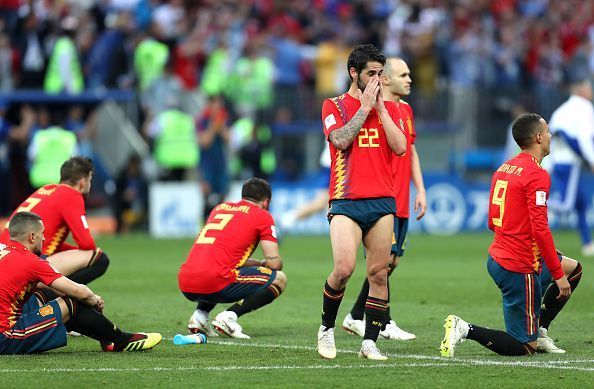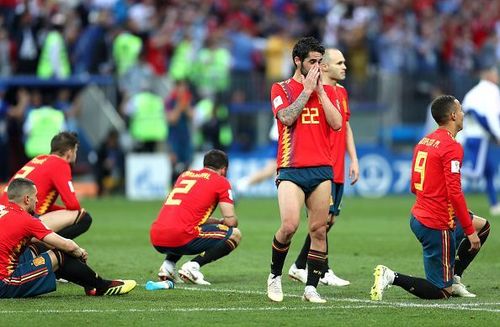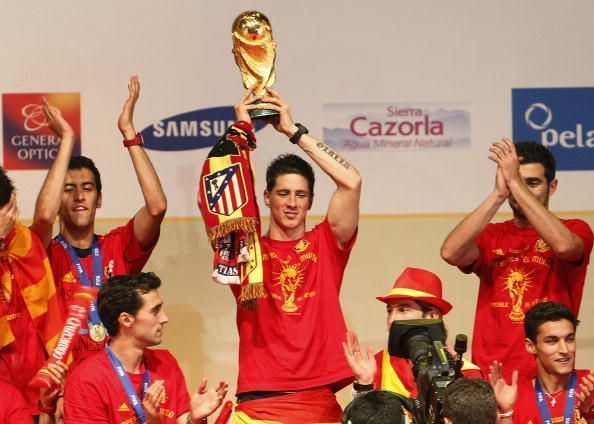
Spain: From the conquest at Johannesburg to the devastation at Moscow

Spanish football is not the most pleasing for people. It was the case then, it is the case now. In Spain, technicality is preferred more over the robust physical type of game, that is visible in England. The Premier League has always been the number 1 league in Europe. The fan following and marketing in EPL is unreal. Still, EPL is not the place where you find aesthetic football. EPL is action packed, end to end football, combined with the flurry of attacks. Spain has been different. That being said, English football hasn't left a mark in football history. The big physical type of play has been far from enough to trouble the German and Spanish oppositions as of late. Spain though has football in its veins.
They have seen it all. From the finals of the World Cup to the exit in group stages. From being invincible to being just another underdog, Spanish football has had its up and downs. A transition phase, with great stars leaving the team and advent of young blood, Spain has gone through it all. As of late, Spanish football and Spanish teams are enjoying high amount of success in Europe.
Spain has been lucky enough to witness the two greatest players on earth at the same time. Spain has given rise to match which brings the world to a standstill. The national team might not have had the success that is expected from them, as of late. But that is what makes it even more enjoyable, a world in which you always have something to fight for. For a better insight into the current scenario, we have to turn back the clock, to where it all began.
2008-12: Golden Spanish Generation

The Spanish Team, a decade ago, a strong 11 with no strong 1s. No individual stars, no talismanic players, certainly not crowd favorites. They didn't have a player around whom a team was built. They weren't fiery attackers like Brazil. Also they didn't have individual stars like Messi and Ronaldo. Perhaps due to these reasons, Spain was not loved by neutrals. But looking back at Spain, it must be said, they exemplified football. From 2008 to 2012, winning everything there was to win. The Spanish football reached the heights, which any nation would want their team to reach. They were a team which proved Johan Cruyff's infamous quote.
"Even with the best players in their respective positions, does not guarantee a strong 11, it just makes 11 strong 1s" . - Johan Cruyff
It was not Vicente Del Bosque’s coaching in the first place. Del Bosque’s tactics, were a perfect fit, no doubt. But he was forced to go with those tactics. Nobody forced him, but the Spanish side then, having the best midfield trio of Xavi-Busquets-Iniesta, David Villa upfront, Puyol and Pique guarding the defences, it was almost an alter ego of Barcelona. With the quality that Del Bosque had at his disposal, with the telepathy that these players possessed, Del Bosque had little choice but to implement the Barcelona style in Spain.
During 2008-12, Spain played fluid football. Passing the ball around, retaining possession, letting the full backs advance, pressing up high, building through the middle and passing with a purpose. Xavi always dictated the pace of the play, Iniesta helped him create magical through balls, and Villa and Torres came up with the finishing touches. Spain solidified their defense, with Puyol always keeping his accomplices on their heels.
During their World Cup 2010 campaign, Spain might have lost one game. But they were absolutely brutal in knockout stages. They racked up their wins. They didn’t sit back after their goals, they attacked purposefully. Even in the Euro Cup that followed, Spain was even more poignant. They dismantled Italy in the finals of the tournament. Pedro, Villa, Torres every player at their level best. 2012 Euros was perhaps the last tournament in which we saw Spain making a statement, on a global level.
After the champions’ curse struck Spain in Brazil, they had to undergo a complete rebuilding phase. Players who were instrumental in previous campaigns, including Puyol, Villa and Xavi all had to leave. Talent in Spain wasn’t lacking though. Ramos adapted to a new center-back role, so well in fact, that he is now one of the best center-backs in the world. But with Xavi gone and nobody to dictate the tempo, the possession football style wasn’t as strong. Del Bosque’s tactical awareness wasn’t as strong after he lost the heart of the team, Xavi Hernandez. His defenses weakened, in absence of Puyol, and finally, Del Bosque’s weak tactical approach was being exposed. He failed to use Thiago Alcantara to his fullest in Xavi’s absence, while he played amazingly at Barcelona then and Bayern now.